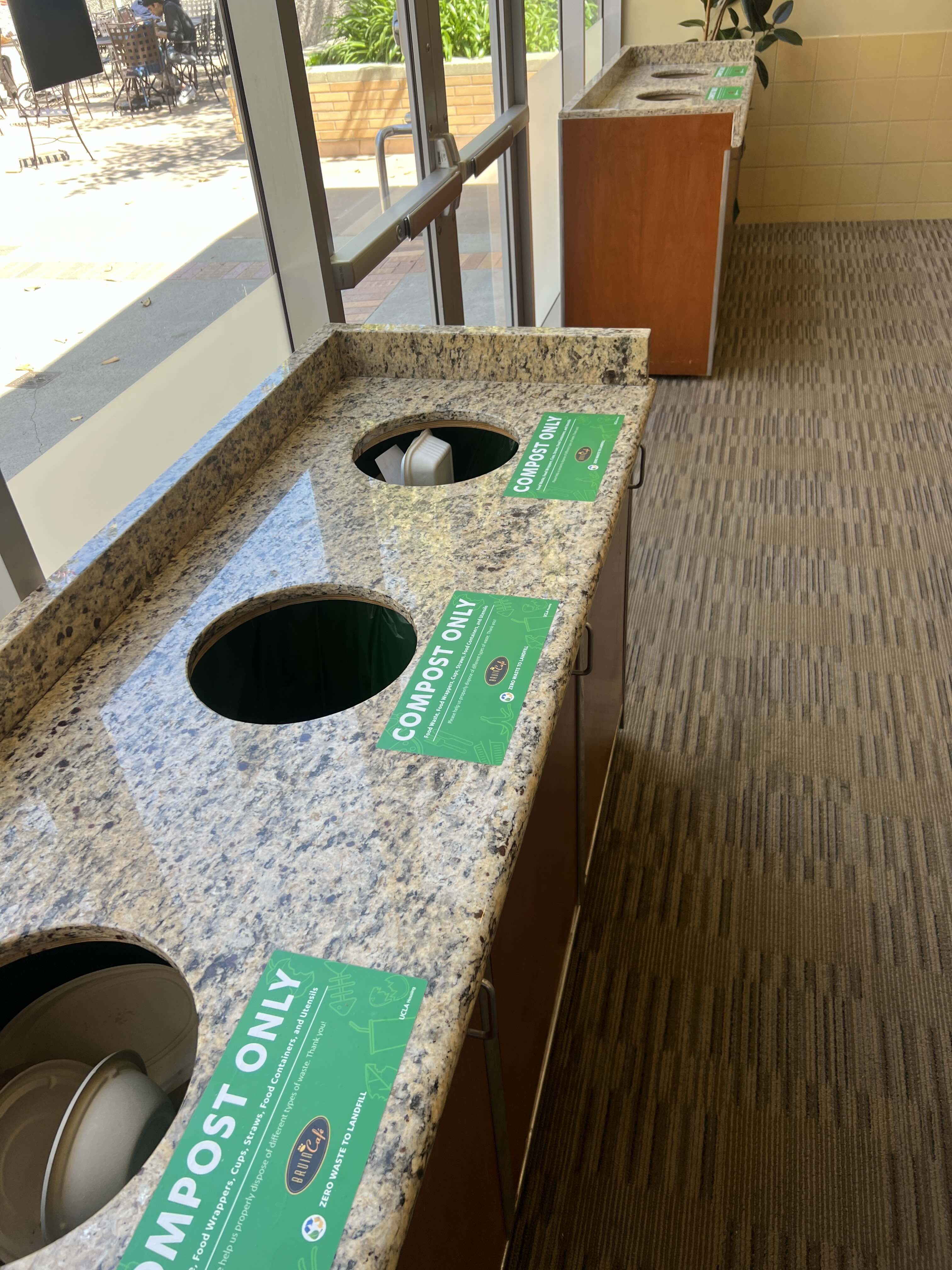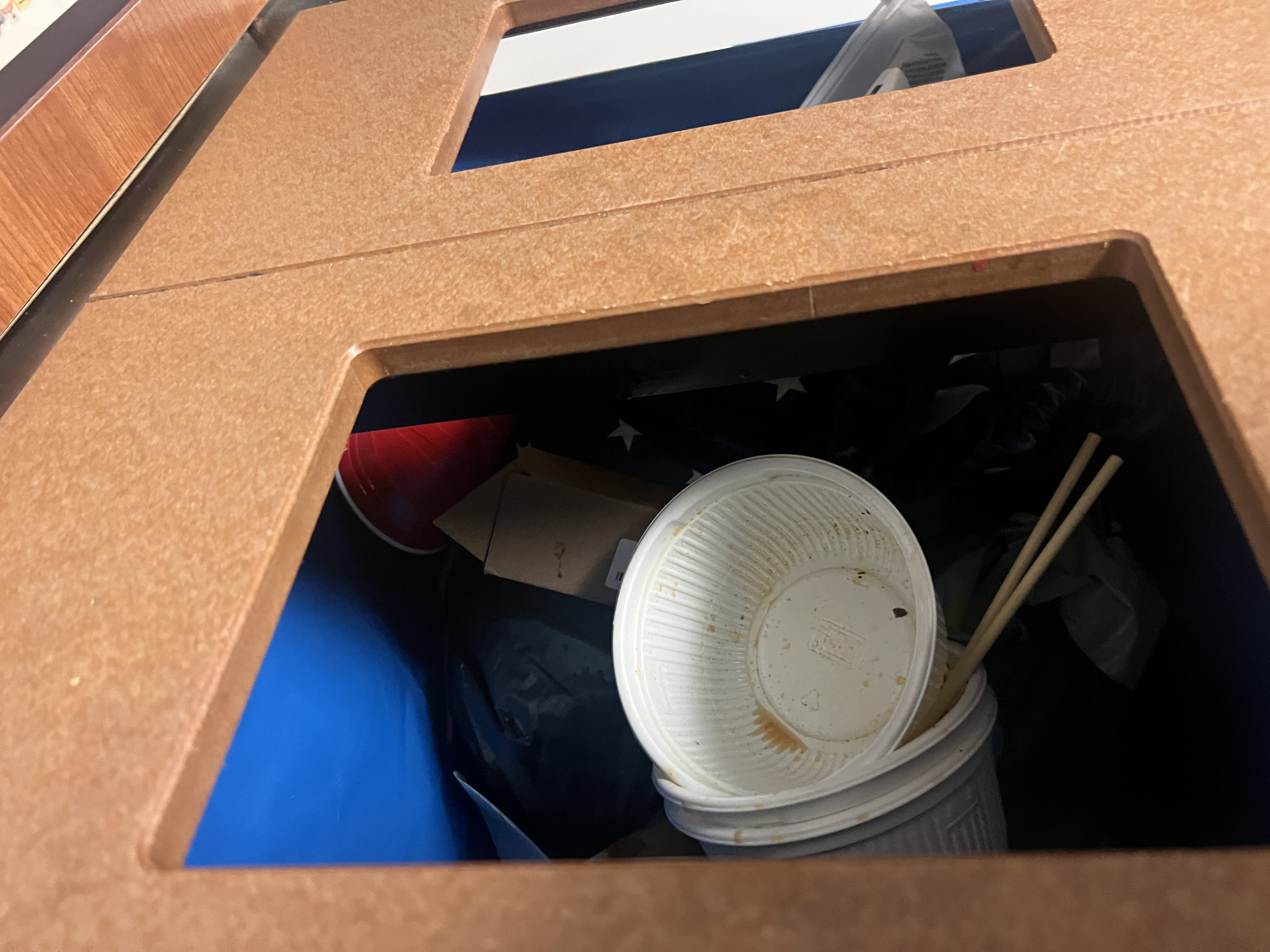Opinion: UCLA must not discard ‘zero waste’ sustainability promises
Slots marked “landfill only” and “recycling only” connect to a single bin in Dykstra Hall (top left). Two trash cans for landfill and recycling are without an accompanying compost bin (top right). A sign says UCLA aims to send no waste to landfills by 2020 (bottom). (Courtesy of Alessandra Kahn)
By Alessandra Kahn
May 22, 2025 6:21 p.m.
This post was updated May 22 at 7:55 p.m.
UCLA is a picture-perfect campus with diverse flora, stunning architecture and top-tier dining options.
The less glamorous components of life at UCLA, like our waste management infrastructure, are not so polished. And that’s putting it lightly.
As part of the Office of Sustainability’s zero waste initiative, the university said it hoped to eventually divert 90% of waste from landfills in favor of recycling or composting. This goal was projected to be achieved in 2020, but has since been modified to “the future,” according to the office’s website.
Currently, the administration reports only a 56% diversion rate. If I had an assignment that was overdue for the past five years, I doubt my professor’s first instinct would be to excuse me from the due date entirely.
UCLA’s sustainability team said an array of factors contributed to the university’s failure to meet its 2020 deadline, including infrastructural hurdles, community behavior and the COVID-19 pandemic.
“Over the past several years, UCLA has invested heavily into resources to address these challenges, including a major infrastructure update, creation of outreach and education programs, increased stakeholder engagement and collaboration, and more,” a UCLA representative said in an emailed statement.
The representative also noted in the statement the university’s zero waste team aims to release a draft of a revised waste reduction plan in the fall, including strategic recommendations for various groups on campus.
According to the United States Environmental Protection Agency, food scraps take up roughly one quarter of landfill space worldwide. When this food decomposes, it releases methane, a powerful greenhouse gas that traps over 28 times as much heat in the atmosphere as carbon dioxide.
Surabhi Biyani, a doctoral student in atmospheric and oceanic sciences, explained that the accumulation of these greenhouse gases in the atmosphere contributed to the explosion in wildfire acreage that the western U.S. has seen in recent years.
“You have land that is essentially just dried out, and so you get more wildfires because of that,” Biyani said.
However, composting – a process that releases greenhouse gases – can decrease methane emissions from landfills and provide nutrients for agricultural purposes.
Recycling has a similar emission-curbing impact, lessening the need to use fossil fuels for plastic production.
In recognition of these benefits, UCLA Facilities Management provides three-stream waste receptacles around campus, allowing for the separate disposal of compostable and recyclable materials. Additionally, quick-service restaurants on campus – like Rendezvous and Bruin Café – supply compostable dining materials and packaging.
It follows, then, that only compost bins line the walls of Bruin Café. Even the least climate-conscious among us should have no issues with this simple, streamlined system.

But there’s a fault with this logic.
If your meal includes one of the few noncompostable materials the restaurant provides, like chip bags and condiment packets, you’ll need to dispose of these items outside – that is, if you care about sorting your waste.
“The decision to implement compost-only bins in the UCLA Dining to-go facilities came from the shift to compostable foodware at these locations,” the UCLA representative said in the emailed statement. “Since the majority of items used there are compostable, Dining aimed to streamline the process and minimize contamination by eliminating the traditional three-bin system.”
Even when everything is sorted properly, we can’t be too confident in its eco-friendly fate.
Pam Nelson is a fourth-year biology student and communications director for UCLA’s Sustainability Action Research program, a student-led initiative to design and implement sustainable solutions for the university and its facilities. As part of a SAR program waste-management project at UCLA Health, Nelson and her colleagues spoke to workers at Athens Services, the company that hauls university waste.
They discovered that materials that don’t decompose within 60 days are taken to the landfill.
“A lot of the material that is being marketed as compostable isn’t actually compostable within that time,” Nelson said.
Problems with composting go beyond UCLA Dining, extending to how waste is managed in on-campus housing.
A few weeks ago, I was disposing of my trash in a Dykstra Hall study lounge when I noticed that the trash and recycling compartments led to the same bin.
This is not an isolated problem. Audrey Jason, a fourth-year psychobiology student and the SAR program director, noticed similarly misleading signage in Powell Library last year.

“It’s kind of frustrating, because at face value, it really feels like it could be impactful, but then there’s just so many inconsistencies with how it’s executed,” Jason said.
Bin setups are currently being reevaluated, while waste audits are either taking place or in preparatory stages, the UCLA representative said in the emailed statement, later adding that Bruins can contact Housing & Hospitality about waste-stream errors.
Already, contaminated recyclables sent abroad for processing risk ending up in landfills and the ocean. We can’t afford to contaminate on purpose.
In our climate of empty sustainability promises, UCLA must treat its zero-waste goal as more than a resume booster.
At first glance, the waste reduction efforts already in place might seem like enough.
We need our leaders to know that we aren’t just glancing – we’re paying attention.
